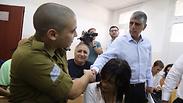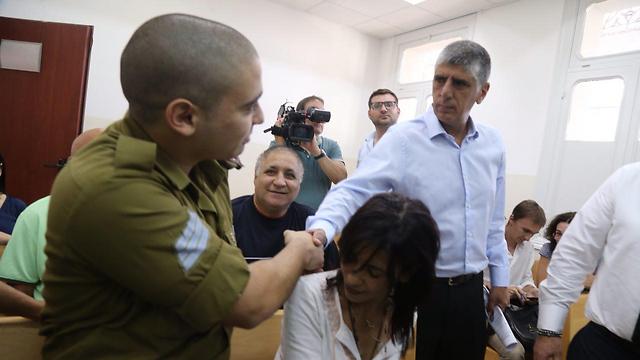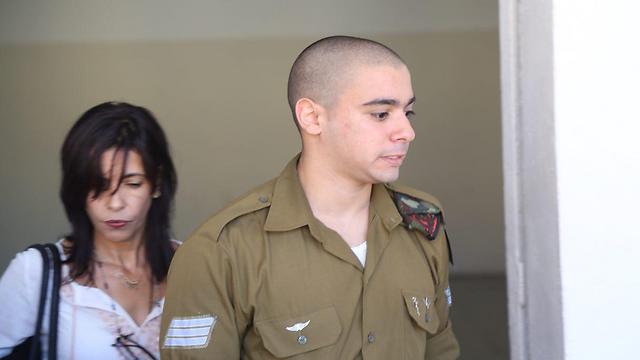
Former Gaza Division commander: 'Azaria didn't shoot to kill'
Brig. Gen. (res.) Shmuel Zakai claims 'I've seen shooting to remove a threat—it's not the same as a person who shoots to kill with the intention of killing.'
"In my lifetime, I've seen people who shot to kill, with the intention of killing, and fortunately all of these people were not IDF soldiers," Zakai said. "And I've seen shooting to remove a threat—it's not the same as a person who shoots to kill with the intention of killing. Those who want to kill shoot to the center of mass and shoot more than one bullet."
He went on to say that "You can see in the video that the soldier is looking at the terrorist, cocks his weapon carefully, fires only one bullet to the head and immediately withdraws back. This is worth more than a thousand witnesses."

"The way Azaria is documented in the videos shooting the terrorist, it was clear to me that he was in danger," the former IDF officer added.
Zakai clarified that "shooting without cause, just to kill, is wrong, and I oppose this most emphatically. When the defendant claimed he shot the terrorist because he thought he was carrying an explosive on his person—then that is a reasonable reason under the circumstances to open fire."
He also stressed that he "understands the difference between concern there is a bomb and the certain identification of an explosive," adding "in my opinion, I assume (Azaria) was afraid of a bomb."
Zakai criticized Azaria's company commander, Maj. Tom Na'aman. "My feeling is that had the company commander properly clarified the rules of engagement, this incident would have been avoided," he said.
Zakai explained that in some operational situations, orders are given that alter the rules of engagement, such as when opening fire would put IDF soldiers at risk. "The company commander, who by his own testimony has conducted many such operations, did not give that order and left the soldier with the previous and unclear rules of engagement," he elaborated.
The former Gaza Division commander did not spare his rod from Azaria's former brigade commander, Col. Yariv Ben-Ezra, either, criticizing the orders he gave his soldiers.
At the end of his testimony, Zakai walked up to Azaria, shook the soldier's hand, and told him: "You acted according to procedures, I believe in your innocence."
Psychiatrist: 'I didn't identify PTSD in Azaria'
After Zakai, psychiatrist Prof. Mark Weiser, who met with Azaria after the incident to assess his mental state, took the stand.
Prof. Weiser clarified that he did not hear testimonies from other soldiers regarding Azaria's mental state after the shooting and that his assessment of the defendant was based solely on their meeting.
During that meeting, Azaria told the psychiatrist that he did not trust his opinion, accusing Prof. Weiser of cooperating with the prosecution in an attempt to convict him at any cost. The soldier also claimed the psychiatrist laughed at him.
Weiser responded to this at court, saying "I told him I wasn't trying to trip him and that I had no interest in acting against him. I didn't laugh at the defendant. I might have smiled at him when he said I wanted to harm him, because I saw this as something that I considered a bit humoristic."
Azaria's attorneys have claimed that the soldier was suffering from trouble sleeping before the attack, and that he arrived at the scene of the incident exhausted.
"According to my assessment, this wasn't the kind of sleep deprivation that might have affected the defendant's behavior," the psychiatrist said. "There is no explanation relating to hours of sleep, cognitive issues or confusion that could explain the defendant's behavior, in my opinion."
He went on to say that the "post traumatic symptoms I identified in Azaria did not justify a diagnosis. It was not my impression that the defendant was suffering from PTSD. He told me the company commander asked him to gather up the brain of the man he shot, and I didn't get the impression this was a particularly special and important incident, that is why I didn't detail it (before)."
Azaria's lawyer, Eyal Besserglick, said at the court hearing on Tuesday that the defense was open to mediation, something the military prosecutor is against.












